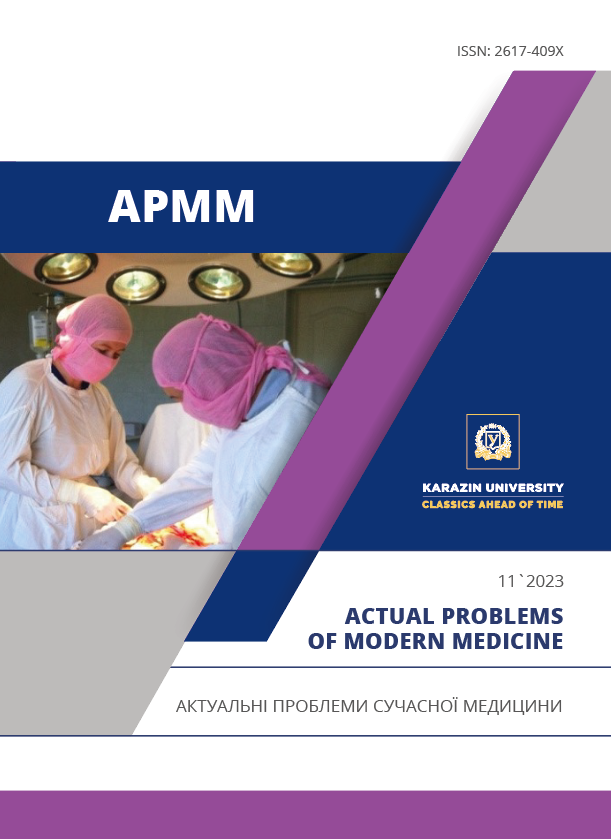Systemic production of cytokines and growth factors in rats with metabolic syndrome
Abstract
ABSTRACT. An important characteristic of the state of the immune system is the production of cytokines, which determine the development of metabolic processes and are aimed at the immune response. Changes in the immune response occur with the development of homeostasis system disorders that change the rheological characteristics of the blood and contribute to the development of the metabolic syndrome (MS). The aim of the study was to study changes in the functional activity of cytokines and angiogenic growth factors (GF) during experimental MS in rats depending on age. Мaterials. MS modeling was carried out on 21 rats, which were divided into 3 groups, 7 animals each, of the same age (1a subgroup - 6 months of age, 2a subgroup - 9 months of age, 3a subgroup - 12 months). In the pathogenesis of the development of MS The role of MS in the development of systemic production of cytokines and FR has been studied, and data on the content of pro-inflammatory cytokines in the peripheral blood depending on the age of rats have been presented. The results of the study of the content of growth factor (GF) and endothelin in peripheral blood in MS tended to decrease with increasing age of rats providing morpho- and angiogenesis (p<0.01). An increase in the concentration of endothelin in the blood serum of rats with MS may contribute to the activation of vascular endothelial cells and an increase in the level of fibrinoid in the vascular system with increasing age. The level of cytokines circulating in the peripheral blood in rats with MS significantly differed from that, which was manifested by an increase in the level of IL-4, IL-8 and IL-10. Spontaneous production of cytokines by peripheral blood lymphocytes in MS increased with the age of rats, which indicated an increase in the secretion of IL-6 and IL-10, and a decrease in the production of IFN-1 and TNF-α. The decrease in spontaneous production of IL-1β and IL-10 in 24-hour cultures of peripheral blood monocytes in rats was significantly higher compared to IL-6 (p<0.001) compared to the 2nd and 3rd - observation groups. The content of IL-8 and TNF-α did not differ significantly (p>0.05), and IL-12 was below the sensitivity limit of the test system (less than 3 pg/ml). Conclusion. The data obtained indicate that in the peripheral blood of rats with MS, the secretion of pro-inflammatory and regulatory cytokines, as well as FR, decreases with age. Hormones also have an inhibitory effect on the production of cytokines by macrophages, the level of which changes significantly during MS. The results of the study indicate various pathogenetic mechanisms of the formation of MS in rats, accompanied by a violation of the immune response of mononuclear cells and angiogenic RF at the system level.
Downloads
References
Sukmanskyi OI. Tsytokiny - nova systema biorehuliatoriv. Visnyk stomatolohii. 2005;3:69-74. [in Ukrainian]
Amaral FA, Bastos LF, Oliveira TH, Dias AC, Oliveira VL, Tavares LD, et al. Transmembrane TNF-α is sufficient for articular inflammation and hypernociception in a mouse model of gout. Eur J Immunol. 2016 Jan;46(1):204-11. DOI: https://doi.org/10.1002/eji.201545798
Kuzmina IU, Shutova NA. The role of metabolic syndrome in the development of chronic inflammation of adipative tissue. TheVIII International Scientific and Practical Conference Challenges in Science of Nowadays Held, on April 4-5, 2021 in Washington, USA. P. 715-720.
Shutova NA, Kuzmina IIu. Zminy morfolohichnoi struktury zhyrovoi tkanyny u shchuriv riznoho viku pry eksperymentalnomu metabolichnomu syndromi. Vid eksperymentalnoi ta klinichnoi patofiziolohii do dosiahnen suchasnoi medytsyny i farmatsii : materialy III naukovo-praktychnoi konferentsiiu studentiv ta molodykh vchenykh z mizhnarodnoiu uchastiu (12 travnia 2021 r., m. Kharkiv). Xarkiv : NFaU, 2021. S. 20–22. [in Ukrainian]
Shutova NA, Kuzmina IIu. Rol zhyrovoi tkanyny ta adypokiniv u rozvytku khronichnoho zapalennia na foni metabolichnoho syndromu. Mizhnarodnyi medychnyi zhurnal. 2021;1(105):83-87. [in Ukrainian]. DOI: https://doi.org/10.37436/2308-5274-2021-1-15
Lee HL, Jang JW, Lee SW, Yoo SH, Kwon JH, Nam SW, et al. Inflammatory cytokines and change of Th1/Th2 balance as prognostic indicators for hepatocellular carcinoma in patients treated with transarterial chemoembolization. Sci Rep. 2019 Mar 1;9(1):3260. DOI: https://doi.org/10.1038/s41598-019-40078-8
Kuzmina IIu, Shutova NA, Nikolaieva OV. Patent na vynakhid №118945 «Sposib modeliuvannia metabolichnoho syndromu v eksperymenti». Opubl.25.03.-2019. Biull №6. [in Ukrainian]
Lee BC, Lee J. Cellular and molecular players in adipose tissue inflammation in the development of obesity-induced insulin resistance. Biochim Biophys Acta. 2014 Mar;1842(3):446-62. DOI: https://doi.org/10.1016/j.bbadis.2013.05.017
Hao G, Duan W, Sun J, Liu J, Peng B. Effects of febuxostat on serum cytokines IL-1, IL-4, IL-6, IL-8, TNF-α and COX-2. Exp Ther Med. 2019 Jan;17(1):812-816. DOI: https://doi.org/10.3892/etm.2018.6972




